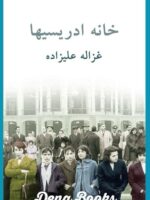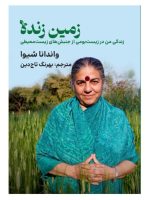-
×
 .چشم مرکب Chashm-e morakab 1 × €7.50
.چشم مرکب Chashm-e morakab 1 × €7.50 -
×
 .خانه ادریسیها The House of the Edrisis 1 × €20.00
.خانه ادریسیها The House of the Edrisis 1 × €20.00 -
×
 .بز زنگوله پا Boz-e zangouleh pa 1 × €7.50
.بز زنگوله پا Boz-e zangouleh pa 1 × €7.50

Leo F. Buscaglia (1924 -1998)
Buscaglia was teaching in the Department of Special Education at the University of Southern California in the late 1960s when one of his students committed suicide. She had been one of the sets of “kind eyeballs” he always looked for in the large auditorium, because her responses showed him that at least one student was hearing what he said, so the news that she killed herself had a great impact on him. [“What are we doing stuffing facts into people and forgetting that they are human beings?”] This incident led him to form a non-credit class titled Love 1A. There were no grades. (How could you potentially fail someone in this class? That wouldn’t be very loving!) The class led to lectures and a manuscript loosely based on what was shared in those weekly classes. The book found a publisher – and an author surprised to find that the simple title LOVE had never previously been claimed, allowing him to say “I have the copyright on LOVE!” Buscaglia said he never taught this class, only facilitated it, adding that he learned as much as anyone. Someone from a Public Broadcasting System affiliate heard one of his talks and arranged to tape a later presentation, eventually showing it during a pledge drive. The response was so strong that it was presented to the national office for consideration. There was great resistance, because a professor simply standing at a podium lecturing was considered old-fashioned, something from the old days of “educational television.” Still, the message and delivery were so compelling that they gave it a try, and Leo Buscaglia’s warm presentations touched viewers’ hearts through the cool medium of television nearly as effectively as they did in person. He has been called the “granddaddy of motivational speakers” on television. His simple message delivered in a dynamic style made him a popular guest on television talk shows, as well as on the lecture circuit. At one time five of his books were on the New York Times Best Sellers List simultaneously.
Life is our greatest possession and love its greatest affirmation.
A Cheerleader for Life
Leo Buscaglia was a cheerleader for life. “Life is a banquet,” he would say, quoting from the movie “Auntie Mame,” ” and most poor fools are starving to death.” He was most closely associated with the topic of love and human relationships, emphasizing the value of positive human touch, especially hugs.
This association with hugging became his trademark at lectures, where thousands of people would stand patiently waiting to hug him after a presentation. It was not uncommon for him to give a talk of about an hour, then stay afterwards signing books and hugging for at least twice that long. This came about when someone spontaneously offered him a congratulatory hug following an early speech. A line formed, and it became an anticipated part of future events. Time restraints on occasion would dictate that those towards the end of the line would have to choose between a hug and an autograph. Nearly all chose the physical connection with this inspiring speaker. And he almost never left until he met everyone in line. Should someone be left out because they hadn’t pushed to the front? Those would have been people he would have missed experiencing, he said, and that would have left him a lesser person.
Biography
Born in Los Angeles, Felice Leonardo Buscaglia (he later inverted the initials) was the youngest of four children of Italian immigrants. He was raised Roman Catholic, and was influenced by Buddhism in his adult life. The combination of physically demonstrative love of life learned from his Mediterranean parents combined with the inner reflection learned from travels and studies in Asia served him well.
His childhood is well known to his listeners and readers; it provided many fable-like experiences that he shared throughout his work. Readers from many diverse cultures identified with these stories, being reminded of elements of their own upbringing. So many letters to him started similar to this: “Dear Leo, I hope I can call you that rather than Dr. Buscaglia because I feel as if I know you, as if we are friends.” His “Mama stories” continue to be quoted by fans. [When someone would identify themselves to him as a “fan,” he would invariably reply, “Don’t be a fan. Fans are fickle and will soon drop you for something else. Be a friend. You can count on friends.”) While other children were playing chase games, little Leo was playing school, always casting himself as the teacher, and always with willing pupils.
He served in the U.S. Navy in World War II. The slender young sailor did not see combat, but he certainly saw its aftermath in his duties in the dental section of the military hospital, helping to reconstruct shattered faces. Using the benefits of the G. I. Bill, he was able to go to the private University of Southern California after the war. His association with USC is somewhat unique in the academic world. He received his bachelor’s, master’s and doctorate degrees there, and later became a faculty member. Upon his retirement, the university president named Buscaglia Professor at Large, an honorary title held by only one other person at that time. His non-credit Love 1A class was right for the times when it began in the late 1960s. He prepared a talk for educational conferences based on these sessions, which he wanted to call simply “Love”.
The reaction to both his dynamic, evangelical delivery and the content was like nothing ever seen in educational circles, and Buscaglia became a popular educational conference presenter. This exposure led to speaking requests by colleges, and by other professional and business organizations.
Once these heartfelt talks were seen on national television they became the largest single money generators for PBS through much of the 1980s. While these presentations paved the way for many motivational speakers on PBS after him, Buscaglia never considered himself one of them. He was simply a teacher whose classroom had become the world.
Over eleven million copies of his books had been purchased in the U.S. by the time of his death by heart attack in 1998. Approximately 24 editions are available throughout the world. He was very pleased and surprised by the strong sales in Italy. He never imagined Italians would need an American to remind them of the importance of food, family, sharing and love of life, because he had learned these things from his Italian parents.
The study of love brought him to the study of life. “To live in love is to live in life, and to live in life is to live in love.” But this should never be done passively. He wrote, “It’s not enough to have lived. We should determine to live for something. May I suggest that it be creating joy for others, sharing what we have for the betterment of personkind, bringing hope to the lost and love to the lonely.” Only you will be able to discover, realize, develop and actualize your uniqueness. And when you do, it’s your duty to then “give it away.”








